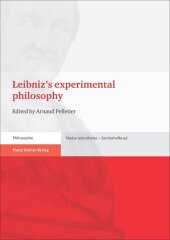 Neuerscheinungen 2016Stand: 2020-02-01 |
Schnellsuche
ISBN/Stichwort/Autor
|
Herderstraße 10
10625 Berlin
Tel.: 030 315 714 16
Fax 030 315 714 14
info@buchspektrum.de |

Arnaud Pelletier
Leibniz´s experimental Philosophy
Ed.: Pelletier, Arnaud
2016. 257 p. w. 16 b&w ill. 240 mm
Verlag/Jahr: FRANZ STEINER VERLAG 2016
ISBN: 3-515-11307-X (351511307X)
Neue ISBN: 978-3-515-11307-6 (9783515113076)
Preis und Lieferzeit: Bitte klicken
The philosophy of Leibniz is often considered as an intellectualism. Speculation is said to take precedence over experience in it. Against this persistent misunderstanding, Leibniz holds that experience plays a constitutive role in all areas of knowledge, even in mathematics and even in metaphysics. For metaphysics itself shall rely on common experiences and empirical observations. In this sense, one can speak of a true experimental philosophy in Leibniz, which does not reduce itself to a mere explanation of natural phenomena through deduction and induction - which was the understanding of ´experimental philosophy´ when Newton coined the term. On the contrary, Leibniz´s experimental philosophy seeks to overcome the vacuity of the modest empiricists and the boldness of the so-called ´experimental philosophers´. Without being exhaustive, this volume brings together contributions on the various facets of this experimental philosophy - and on the various aspects of experience itself - from considerations in metaphysics and natural philosophy to Leibniz´s project of an encyclopaedia of all knowledge.
Pelletier, Arnaud
Arnaud Pelletier holds a PhD from Paris-Sorbonne University on the issue of categories in Leibniz. He is a former research fellow of the Thiers Foundation (Institut de France, Paris), visiting researcher at King´s College London, fellow of the Alexander von Humboldt-Foundation (at the Leibniz-Archive, Hanover, Germany) and Marie Curie postdoctoral researcher (at the University of Leuven, Belgium). He is currently professor for Modern Philosophy at the Université libre de Bruxelles. His main focus is early modern German philosophy from Leibniz to Kant.


